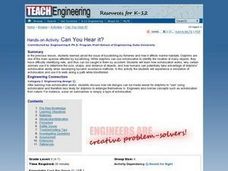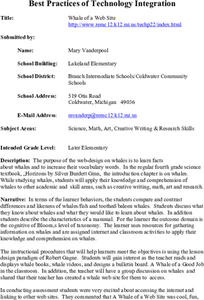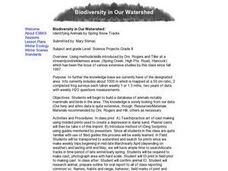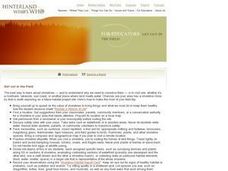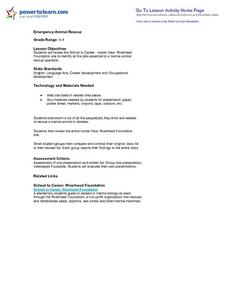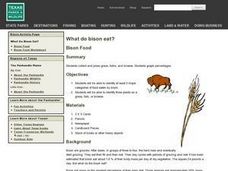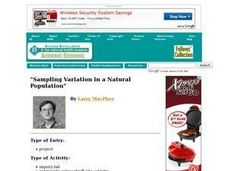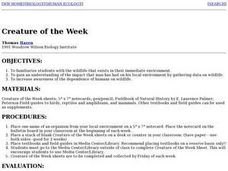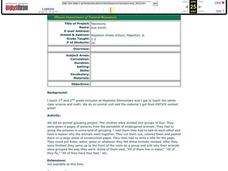Curated OER
Can You Hear It?
Students work together to discover the concept of echolocation. They examine dolphins and their behaviors. They discuss how humans could use this information to help them in their everyday lives as well.
Curated OER
Venom!
Students examine the nature of venom. They conduct an experiment to demonstrate how proteins such as venoms can be denatured using raw eggs, beakers, heated water, and compresses.
Curated OER
Predator Prey Population Links
Fifth graders relate population of animals to its available food supply. They participate in an experiment and gather information. They use the data to draw conclusions.
Curated OER
Horses
Students discuss the importance of the horse as a "beast of burden" animal in Japanese culture and create a legend, myth or tall tale set in Japan with a horse as the central character.
Curated OER
Whale of a Web Site
Young scholars research the characteristics of toothed/baleen whales in books and on the internet. The students participate in whale projects, quizzes, and activities on the internet sites provided.
Curated OER
Biodiversity in Our Watershed
Eighth graders create a database of animals and birds in the area in which they live. They use molded prints to make a cast of an imprint from a specific animal. They identify and research animals and prepare an outline for an oral...
Curated OER
Get Out in the Field
Students visit a shoreline--of an ocean, a lake, a pond, a riverbank, etc., survey it and record what they find there. They map the shoreline and surrounding area and conclude where potential waterfront projects could occur.
Curated OER
Natural Inquirer
Students interview wildlife experts to gain information needed to research and write a report about an aquatic plant or animal affected by climate change.
Curated OER
Emergency-Animal Rescue
Pupils brainstorm list of people and jobs they think are needed to rescue distressed marine animal, review entire Inside View: Riverhead Foundation site, create revised list, compare and contrast original class list to revised list, and...
Curated OER
Sing It To Me
Learners raise public awareness of a specified organization. They discuss their favorite jingles slogans or sayings associated with a company. In groups, students create and perform an advertisement for the entire class. Learners...
Curated OER
Fighting Conservation Crime
Students identify and interpret the evolution and sources of law in Canada. Students compare and contrast the legal rights and responsibilities of individuals, groups, and organizations in Canadian society. Students write a one-page...
Curated OER
Show Me The Dinos
Students explore a site of numerous fossil excavations. Using an interactive quarry map, they locate dinosaur specimens and individual bones. In groups, students use "Show Me" cards to answer questions, compile information, and create...
Curated OER
Fox hunting debate
Students read the internet article "Hundreds of Hunts Out Despite Ban". The teacher then holds a class discussion about it. Students then hold a formal debate representing all points of view on the issues. Students then write a...
Curated OER
Animal ABC Book
Students in class choose a letter of the alphabet and uses the Enchanted studying web site to pick which animal they copy and paint for their letter. Students copy animal printout and paint or color it.
Curated OER
What do Bison Eat?
Middle schoolers identify the three major categories of food eaten by bison. In groups, they collect examples of grass and forbs and press them. They complete a chart of the percentages of each type of food the bison eat in a day. ...
Curated OER
Sampling Variation in a Natural Population
Learners examine the phenotypic variation within a natural population of a single species. They collect data on the species and analyze the data using statistical/spreadsheet software. Students interpret their results and present their...
Curated OER
Creature of the Week
Students explore the habits and biology of the wildlife that resides in their area. They fill in a Creature of the Week sheet for a different animal each week using field guides and textbooks.
Curated OER
Biodiversity: El Imposible National Park, El Salvador
Fifth graders explore the concept of how the more diverse an ecosystem is, the more interdependence of species exists within that system. The complex relationships among diverse species are difficult to identify. As species disappear or...
Curated OER
Surviving in Our Ecosystems
Third graders identify the characteristics of a frog and compare them to a human child. They draw and describe the best environment for a human to live in and the best environment for a frog to live in based on their physical...
Curated OER
Taxonomy
Students work together to identify groups of endangered animals. Using a pamphlet, they group the pictures according to specific criteria and cut the pictures out and color them. They place the animals in the correct habitat and share...
Curated OER
Creating a Multimedia Presentation
Students are divided into teams to make a presentation about their state. Each team is responsible for making one part of the presentation. At the end, all parts are combined to make one complete presentation. While creating the...
Curated OER
Why do we need Vitamin C in our diet? Or Why do we carry old inactive genes in our genome?
Pupils explore and explain how mutations in the DNA sequence of a gene may be silent or result in phenotypic change in an organism and in its offspring. They analyze how evolution and biodiversity are the result of genetic changes that...
Curated OER
Evolution: Adaptation
Tenth graders practice new skills and apply them. The skills of research should motivate them to want more knowledge. The concept of adaptation is used as a context for the lesson of practicing research skills.
Curated OER
The Same But Different
Fourth graders observe different types of bats. They look for characteristics that appear to be fundamental for survival. Students observe population numbers in order to identify if adaptations aid in survival.
Other popular searches
- Ocean Mammals
- Characteristics of Mammals
- Marine Mammals
- Mammals and Fish
- Animals Mammals
- Human/mammal Life Cycle
- Land Mammals
- Mammals (Wildlife)
- Prehistoric Mammals
- Mammal Characteristics
- Mammals Word Search
- Mammals Crossword


